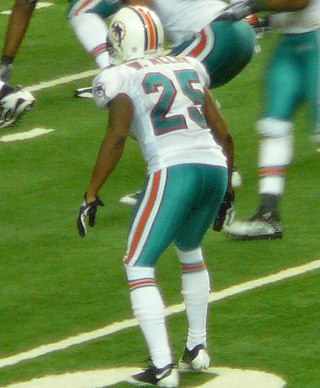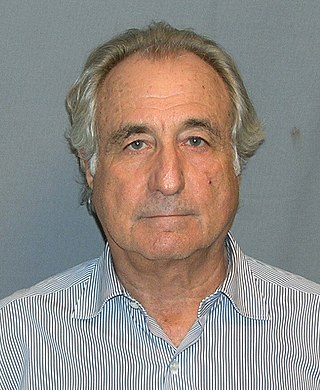Related Research Articles

Charles Ponzi was an Italian charlatan and con artist who operated in the United States and Canada. His aliases included Charles Ponci, Carlo, and Charles P. Bianchi.

Vincent Lamar Wilfork is an American former professional football player who was a nose tackle in the National Football League (NFL) for 13 seasons, primarily with the New England Patriots. He played college football for the Miami Hurricanes and was selected by the Patriots in the first round of the 2004 NFL draft. He also played two seasons for the Houston Texans before retiring following the 2016 season. Along with Tom Brady, Wilfork is the only Patriots player to win the Super Bowl in both decades of the Patriots dynasty.
Russell Erxleben is an American former professional football player and currency investor. He shares the record for the longest successful field goal in NCAA history at 67 yards, which he set in 1977 while playing for the University of Texas. Erxleben was a three-time All-American punter. He was selected in the first round of the NFL draft, an extremely rare occurrence for a kicker. After an NFL career lasting six years, he became a currency investor. Convicted of securities fraud in 1999, he was released from federal prison in 2005. He was again convicted of investment fraud in 2014 and sentenced to 90 months in federal prison.

Will D. Allen is an American former professional football player who was a cornerback in the National Football League (NFL). Allen played college football for the Syracuse Orange. He was selected in the first round of the 2001 NFL draft by the New York Giants.
Kirby Hocutt is the athletic director at Texas Tech University in Lubbock, Texas and the Big 12 representative to the College Football Playoff committee. Additionally, Hocutt is the chairman of the NCAA Division I Football Recruiting Subcommittee. Hocutt formerly held the same position at Ohio University in Athens, Ohio from 2005 to 2008 and the University of Miami in Coral Gables, Florida from 2008 to 2011.
Alexander Wolff is a writer for Sports Illustrated and former owner of the Vermont Frost Heaves of the Premier Basketball League (PBL).

Frank James Haith Jr. is an American men's basketball coach, currently serving as an assistant coach for the University of Texas. He previously served as head coach of the Tulsa Golden Hurricane from 2014 to 2022, and prior to that he served as the head coach at the University of Miami and the University of Missouri, leaving both programs in the midst of NCAA investigations.
Paul T. Dee was general counsel and athletic director of the University of Miami in Coral Gables, Florida. He held the position of University of Miami athletic director from 1993 until 2008.
Michael L. Huyghue is a sports lawyer and businessman and former commissioner of the United Football League, having served in that capacity since the league's founding in 2007. He was previously a member of the legal department of the NFL Players Association before joining the NFL Management Council. Uniquely positioned from having thus worked on both sides of the player/management relationship, he called for the 2011 NFL labor standoff to be settled by keeping the lawyers for both sides out of the negotiating process.
Thomas Joseph Petters is a former American businessman and chairman and CEO of Petters Group Worldwide, a company which stole over $2 billion in a Ponzi scheme. He was convicted of massive business fraud in 2009 and was imprisoned at the United States Penitentiary, Leavenworth. Amid mounting criminal investigations, Petters resigned as his company's CEO on September 29, 2008. He was convicted of numerous federal crimes for operating Petters Group Worldwide as a $3.65 billion Ponzi scheme and received a 50-year federal sentence.

Bernard Lawrence Madoff was an American financial criminal and financier who was the admitted mastermind of the largest known Ponzi scheme in history, worth an estimated $65 billion. He was at one time chairman of the Nasdaq stock exchange. Madoff's firm had two basic units: a stock brokerage and an asset management business; the Ponzi scheme was centered in the asset management business.

The 2011 Miami Hurricanes football team represented the University of Miami during the 2011 NCAA Division I FBS football season. It was the Hurricanes' 86th season of football and 8th as a member of the Atlantic Coast Conference. The Hurricanes were led by first-year head coach Al Golden and played their home games at Sun Life Stadium. They finished the season 6–6 overall and 3–5 in the ACC to finish in a two-way tie for fourth place in the Coastal Division. The Hurricanes served a self-imposed bowl ban due to an ongoing NCAA investigation.
The 2011 University of Miami athletics scandal was a University of Miami athletics scandal involving the university's football and men's basketball programs between 2002 and 2010.
The Mantria Corporation Ponzi scheme has been described as the "biggest green energy scam" in United States history. A Federal judge in the Securities and Exchange Commission's civil case found Mantria had scammed more than $54.5 million “by egregiously, recklessly, knowingly, and shamelessly perpetrating a fraudulent scheme” that used “misrepresentations, omissions, and blatant lies to induce unsuspecting and unwitting victim investors to liquidate the equity in their homes and take out bank loans to invest in Defendants’ scheme, which was nothing more than smoke and mirrors.” On November 16, 2009, the U.S. Securities and Exchange Commission charged four people who targeted those nearing retirement age who were seeking real estate and "green" investments. Many of these securities were offered by Mantria Corporation.
Brian Kim is an American former hedge fund manager. He founded the now-defunct Liquid Capital Management LLC, which focused on futures trading.
Mutual Benefits Corporation was a Ft. Lauderdale, Florida based investment sales company that operated a huge ponzi scheme selling viatical settlements, with investors losing an estimated $835 million. The principal ring leader of the scam was Joel Steinger.
Woodbridge Securities was a $1.2 billion Ponzi scheme run by CEO Robert H. Shapiro.
References
- 1 2 3 Robinson, Charles (2011-08-16). "Renegade Miami football booster spells out illicit benefits to players". Yahoo! Sports . Retrieved 2011-08-17.
- ↑ Smith, Erick (2011-08-15). "Lawyer: Nevin Shapiro is helping NCAA's investigation of Miami". USA Today . Retrieved 2011-08-17.
- 1 2 3 4 5 6 7 Tim Elfrink (2010-12-16). "Nevin Shapiro: Miami's Caligula". Miami New Times . Retrieved 2011-08-17.
- 1 2 3 4 "CEO of Capitol Investments USA, Inc. Sentenced to 20 Years in Prison for $930 Million Ponzi Scheme Based on Phony Grocery Business". Federal Bureau of Investigation. 2011-06-07. Retrieved 2011-08-19.
- 1 2 Voreacos, David (2011-06-08). "Wholesale Grocery Owner Gets 20-Year Sentence in $930 Million Ponzi Scam". Bloomberg . Retrieved 2011-08-18.
- ↑ "Convicted Ponzi schemer and ex-Miami Hurricanes booster Nevin Shapiro transferred to home confinement". www.yahoo.com. 12 June 2020.
- ↑ Sports Agent Blog (2011-08-16). "Miami Booster Claims UFL Commissioner Provided Benefits To Student-Athletes". Business Insider . Retrieved 2011-08-19.
- ↑ "University of Miami lacked institutional control resulting in a decade of violations". NCAA. 2013-10-22. Retrieved 2015-01-10.
- ↑ "Source:Shapiro lawyer got money". ESPN.com. 2013-02-06. Retrieved 2015-01-10.
- ↑ Andrea Adelson, ESPN.com October 22, 2013